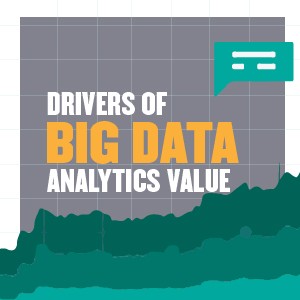Drivers of Big Data Analytics Value
Article
Unlocking the drivers of Big Data analytics value in firms. Nadine Côrte-Real, Pedro Ruivo, Tiago Oliveira, and Aleš Popovič.
Journal

Journal of Business Research, 2019, Vol. 97 (160-173)
Reviewer
Dr. Brady Brewer, Assistant Professor
Summary
The term Big Data has been a buzz word of sorts in both industry and academic circles. In some instances, the definition of what makes data big and what it involves varies drastically from one field to the next. On top of this, the value that is derived from Big Data is hard to quantify. According to this study, even though most companies collect some sort of Big Data, 43% of firms obtain little or no value from it.
For the purpose of clarity in this review, I am going to combine Big Data with all types of data analytics. The authors of this research define Big Data as “technologies and techniques that a company can employ to analyze large-scale, complex data for various applications intended to augment firm performance across various dimensions.” Because the definition of what constitutes “large and complex” data is an extremely fuzzy line, I think it is best to extrapolate to all data analytics. After all, value creation stems from all decisions, big and small.
To address these issues, this paper explores Big Data, the analytical procedures used, and the antecedents to providing value in the firm before value is created from Big Data. The authors find that value can be found through Big Data in three distinct ways: sustained, real and potential value. Potential value is the operational side of the business, creating value through everyday improvements. Real business value is the innovation that a company provides through new products or collaborations. Finally, sustained business value is the dynamic capabilities and strategy of the firm that provides a distinct competitive advantage.
The authors find that the most important antecedent to creating value through data is being dynamic and flexible with strategies. This means that the company is not only willing to curate and analyze the data, but use the findings to adapt to external changes. The second antecedent for value creation through data is firm agility. Being able to implement strategies quickly is imperative to beating the competition and achieving the first mover advantage. This suggests that firms who create the most value from data analytics are already dynamic and flexible, the data just provides a roadmap to follow in a timely manner. The researchers conclude that data analytics is not a replacement for strategic initiatives; however, it is a tool within a broader toolbox to make better decisions. The firms that were already dynamic and flexible before using Big Data benefited the most from its use.
What this means for Food and Agricultural Business
Much like the rest of the general economy, Big Data, and data analytics in general, have gotten their fair share of press recently. Indeed, companies have started providing data solutions for all levels of the agricultural value chain, whether it is precision agricultural technologies for farms or logistical analysis for a food processor. However, this study says that 43% of firms get little to no value out of the analytics. Recent studies from the Purdue University Center for Food and Agricultural Business on data along the agricultural value chain suggests this number is even higher for agricultural firms. This answers the question as to why so much emphasis and attention have been given to data and the analytics that come along with it. Firms, not just in agriculture, are struggling to figure out the value it creates.
Improving firm performance through better decision making is the broad goal of collecting and analyzing data. The agribusinesses that are already dynamic and flexible have the most potential to create value with data analytics. To put this into perspective, even without data, the agricultural sector has seen rapid improvements in efficiency and innovation throughout its vast history. Thus, it is no surprise that some agribusinesses are still doing quite well even though they are not heavily utilizing data and analytics. Agribusinesses should not look at the data as an end goal, rather, it has to be a refined tool in the ever-expanding strategy toolbox that can help guide decision making. In today’s fiercely competitive market, every advantage is crucial to an agribusiness’s success. In my experience, data can tell us very little when we don’t have a plan prior to its use. Knowing how data can help answer a question not only improves data collection and quality but also helps to streamline the analysis so that valuable decisions can be made.
RELATED POSTS:
Optimizing Sales Management: Knowledge, Coaching and Continuous Improvement
While we used to think that exceptional salespeople possessed an innate gift, recent data suggests the impact of today’s sales managers in nurturing and refining this gift to unlock its fullest potential.
A great moment for value-based sales in agribusiness
Value-based sales can empower companies to craft compelling value propositions, understand the customer’s business model and effectively communicate to stakeholders.
How can big data empower the development of new products?
Data is one of the most powerful resources for a company. It enables accurate decision-making and minimizes risk, ensuring greater revenue and sustainable growth.
